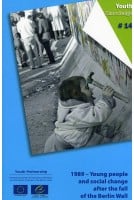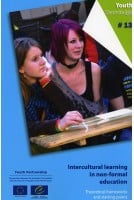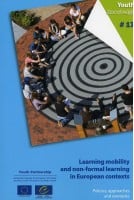



If we consider the 50 states having ratified the European Cultural Convention of the Council of Europe or the member states of the European Union, the multiple and divergent nature of the realities, theories, concepts and strategies underlying the expression “youth work” becomes evident. Across Europe, youth work takes place in circumstances presenting enormous differences with regard to opportunities, support, structures, recognition and realities, and how it performs reflects the social, cultural, political and economic context, and the value systems in which it is undertaken.
By analysing theories and concepts of youth work and by providing insight from various perspectives and geographical and professional backgrounds, the authors hope to further contribute to finding common ground for – and thus assure the quality of – youth work in general. Presenting its purified and essential concept is not the objective here. The focus rather is on describing how to “provide opportunities for all young people to shape their own futures”, as Peter Lauritzen described the fundamental mission of youth work.
The best way to do this remains an open question. This Youth Knowledge book tries to find some answers and strives to communicate the strengths, capacities and impact of youth work to those within the youth sector and those beyond, to those familiar with its concepts and those new to this field, all the while sharing practices and insights and encouraging further reflection.
Introduction
Youth work – An incomprehensible subject? Introductory reflections on youth work (Hanjo Schild, Jan Vanhee and Howard Williamson)
Section I – Theories and concepts in selected European regions and countries
1. Winning space, building bridges – What youth work is all about (Howard Williamson)
2. Youth work in Flanders – Playful usefulness and useful playfulness (Guy Redig and Filip Coussée)
3. Youth policy in eastern Europe and the Caucasus (Evgeniia Petrivska)
4. Saying, doing, relating – Reflecting on youth work praxis in Finland (Tomi Kiilakoski)
5. Youth work in France (Laurent Besse, Jérôme Camus and Marc Carletti)
6. Youth work and youth social work in Germany (Andreas Thimmel)
7. Thinking about youth work in Ireland (Maurice Devlin)
8. Youth work in Italy – Between pluralism and fragmentation in a context of state non-interference (Daniele Morciano)
9. Above the horizon – Shifting landscapes in youth work in Malta (Miriam Teuma)
10. Supporting development and integration of young people – Trends in current youth work practice in Poland (Ewa Krzaklewska)
11. Youth work: a Portuguese point of view (Carlos Pereira)
12. Theories and concepts of youth work in South-East Europe (Gazela Pudar Draško)
13. Youth work in Spain – Approaches and main issues (Rafael Merino Pareja)
14. Influential theories and concepts in UK youth work – What’s going on in England? (Pauline Grace and Tony Taylor)
Section II – Key challenges of youth work today
15. Key challenges of youth work today – An introduction (Nuala Connolly)
16. Finding common ground – Mapping and scanning the horizons for youth work in Europe (Howard Williamson)
17. Youth work and an internationally agreed definition of youth work – More than a tough job (Guy Redig)
18. What are the meanings and the underlying concepts and theories of youth work? (Lasse Siurala)
19. What are the aims and anticipated outcomes of “youth work” at national, European and other transnational levels? (Valentina Cuzzocrea)
20. A critical approach to youth work categorisations (Marko Kovacic)
21. Where are the connections between youth work and wider work with young people? (Hanjo Schild and Howard Williamson)
22. Keep calm and repeat – Youth work is not (unfortunately) just fun and games (Özgehan Şenyuva and Tomi Kiilakoski)
23. Education and training for the development of professional youth work practice and quality standards (Sladjana Petkovic and Manfred Zentner)
24. The value of youth work and public authorities (Areg Tadevosyan and Howard Williamson)
25. Young people, youth work and the digital world (Nuala Connolly)
26. What role can youth work play in relation to the children of migrant workers of the first, second and third generations? (Albert Scherr and Gökçen Yüksel)
27. Illegalised young bodies – Some reflections for youth work practice (Maria Pisani)
28. Youth radicalisation and the role of youth work in times of (in)security (Dora Giannaki)
Section III – Reflections on the recommendations made in the Declaration of the 2nd European Youth Work Convention
29. Further exploring the common ground – Some introductory remarks (Hanjo Schild)
30. Youth work in Europe – Europe in youth work (a blog) (Peter Wootsch)
31. Assuring the quality of youth work (Jonas Agdur)
32. The present and the future of youth worker training in Europe (Gisèle Evrard Markovic and Darko Markovic)
33. A three-dimensional youth work evaluation model (Marti Taru)
34. Towards knowledge-based youth work (Helmut Fennes)
35. Funding sustainable youth work (Claudius Siebel)
36. Youth work, cross-sectoral youth policy, and co-operation: critical reflections on a puzzling relationship (Magda Nico)
37. “Participation and civic dialogue” through the prism of public policy in France (Jean-Claude Richez)
Conclusions and outlook
Hanjo Schild, Nuala Connolly, Francine Labadie, Jan Vanhee and Howard Williamson (editorial team)
Appendices
Appendix 1 – Declaration of the 1st European Youth Work Convention
Appendix 2 – Declaration of the 2nd European Youth Work Convention
Appendix 3 – Recommendation CM/Rec(2017)4 of the Committee of Ministers to member States on youth work
About the editorial team and the authors
Télécharger un extrait (1000)









If we consider the 50 states having ratified the European Cultural Convention of the Council of Europe or the member states of the European Union, the multiple and divergent nature of the realities, theories, concepts and strategies underlying the expression “youth work” becomes evident. Across Europe, youth work takes place in circumstances presenting enormous differences with regard to opportunities, support, structures, recognition and realities, and how it performs reflects the social, cultural, political and economic context, and the value systems in which it is undertaken.
By analysing theories and concepts of youth work and by providing insight from various perspectives and geographical and professional backgrounds, the authors hope to further contribute to finding common ground for – and thus assure the quality of – youth work in general. Presenting its purified and essential concept is not the objective here. The focus rather is on describing how to “provide opportunities for all young people to shape their own futures”, as Peter Lauritzen described the fundamental mission of youth work.
The best way to do this remains an open question. This Youth Knowledge book tries to find some answers and strives to communicate the strengths, capacities and impact of youth work to those within the youth sector and those beyond, to those familiar with its concepts and those new to this field, all the while sharing practices and insights and encouraging further reflection.
Attention, en vertu de nos conditions générales de vente, l'achat des PDF/epub est réservé aux particuliers.
